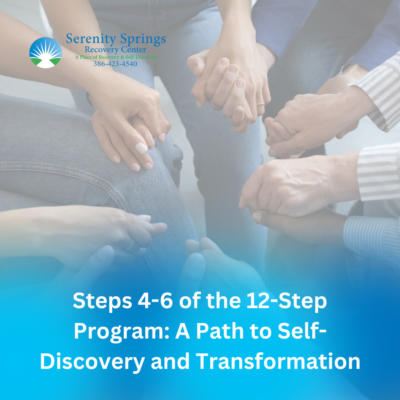Steps 4-6 of the 12-Step Program: A Path to Self-Discovery and Transformation

The 12-step program, originally devised by Alcoholics Anonymous (AA), has been a foundational approach to recovery from addiction for many people worldwide. The program is structured into twelve distinct steps, each offering guidance and support to those seeking sobriety and personal growth. Steps 4 through 6 are particularly critical as they delve into personal introspection and prepare individuals for meaningful change.
Step 4: Made a Searching and Fearless Moral Inventory of Ourselves
Overview: Step 4 requires individuals to conduct a deep, honest self-examination. This “moral inventory” is not just about recognizing faults but also understanding one’s strengths, weaknesses, and patterns of behavior that have contributed to their addiction.
Process:
- Honesty and Courage: This step demands a level of honesty that can be daunting. It requires acknowledging truths about oneself that may have been ignored or denied for years.
- Writing it Down: Many find it helpful to document their inventory. Writing helps organize thoughts and ensures that nothing significant is overlooked.
- Guidance: Engaging a sponsor or a trusted individual for guidance can provide perspective and support. Their experience can help navigate the emotional challenges that arise during this process.
- Balance: It’s essential to recognize positive traits and accomplishments alongside the negative. This balanced approach can prevent feelings of overwhelming guilt and shame.
Challenges:
- Emotional Pain: Confronting past actions and behaviors can be painful. Feelings of guilt, shame, and regret are common.
- Fear of Judgment: There can be a fear of being judged by oneself or others. It’s crucial to remember that this process is about personal growth, not punishment.
Step 5: Admitted to God, to Ourselves, and to Another Human Being the Exact Nature of Our Wrongs
Overview: Step 5 involves confessing the moral inventory to oneself, a higher power (as one understands it), and another person. This step aims to cleanse the individual of secrets and share the burden of their past actions.
Process:
- Choosing the Right Person: It’s vital to select someone trustworthy and non-judgmental, often a sponsor or a counselor. This person should provide a safe space for sharing.
- Spiritual Element: Admitting to a higher power, regardless of religious beliefs, can be a form of spiritual cleansing and acceptance.
- Self-Admittance: Acknowledging these truths to oneself is equally important. It solidifies the recognition and acceptance of one’s past.
Benefits:
- Relief and Liberation: Sharing one’s deepest secrets can be liberating. It often brings a sense of relief and a lighter emotional burden.
- Accountability and Insight: Discussing the inventory with another person provides accountability and can offer new insights and perspectives.
Challenges:
- Vulnerability: Admitting faults to another person can make one feel vulnerable and exposed.
- Fear of Rejection: There may be a fear that the other person will judge or reject them based on their past actions.
Step 6: Were Entirely Ready to Have God Remove All These Defects of Character
Overview: Step 6 is about readiness for change. It involves becoming entirely willing to let go of one’s character defects and allow a higher power to help remove them.
Process:
- Acceptance: This step requires full acceptance of one’s character defects and the desire to change them.
- Willingness: Being “entirely ready” means more than just acknowledging the defects. It involves a deep, earnest willingness to let them go.
- Spiritual Trust: Trusting a higher power to aid in removing these defects can be challenging but is central to this step.
Benefits:
- Preparation for Change: This step prepares individuals for the transformative processes in subsequent steps.
- Empowerment: Readiness to change can instill a sense of empowerment and hope.
Challenges:
- Fear of Change: Letting go of familiar, even if harmful, behaviors can be frightening.
- Reluctance: There might be a reluctance to let go of certain traits or behaviors that one feels define them.
The Profound and Lasting Impact of Steps 4, 5, and 6 on Personal Growth and Recovery
Steps 4 through 6 of the 12-step program are pivotal in the journey of recovery. They require deep introspection, honesty, and a willingness to embrace change. While challenging, these steps offer profound opportunities for personal growth and healing. By engaging in a fearless moral inventory, admitting one’s faults, and becoming ready for transformation, individuals lay a strong foundation for lasting sobriety and a healthier, more fulfilling life.




